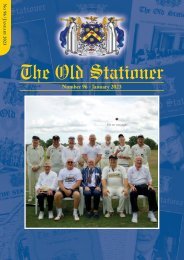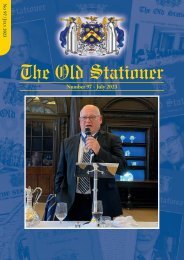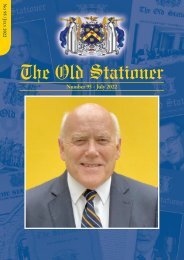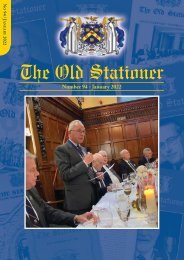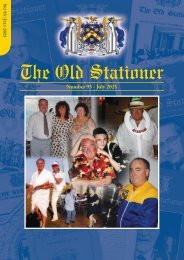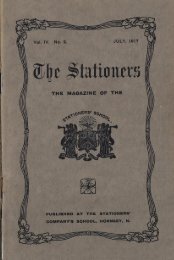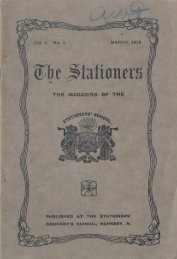OSAmag88
You also want an ePaper? Increase the reach of your titles
YUMPU automatically turns print PDFs into web optimized ePapers that Google loves.
T h e O l d S t a t i o n e r - N o 8 8
MEMBERSHIP
SECRETARY’S REPORT
Paying members at 6th Oct 2018 489
Life member 1
Honorary members 11
New members 12
Deaths (11)
Resignations (1)
Deletions (for non-payment) (4)
TOTAL 497
Unless there are some additional new
members between now and the year end
the total number of members will drop
below 500. I have no intention of trying
to determine the last time this total was
below this number. It was probably many
years ago!
Since the last magazine the following new
membership applications have been
approved:
Paul Biddulph
1958 to 1963 Norton House
7 Loyne Close, Linslade
Leighton Buzzard, Beds LU7 2YR
Dr Geoffrey Quick
1963 to 1970 Meredith House
Whistling Pines, 70 Crooksbury Road,
Farnham, Surrey GU10 1QD
Mickey Wood
1967 to 1973 Caxton House
5 Patmore Link Road,
Hemel Hempstead, Herts HP2 4PX
Edward Winter
1958 to 1965 Hodgson House
Woodstock Farm, Gadbrook Road,
Betchworth, Surrey RH3 7DE
The following deaths have also been
notified:
Ben Batchelor, Barry McRae, Ian Snelling,
Ernie Stone & Peter Jolly. Not a good year
for ex-OSFC players. Obituaries will
appear elsewhere in the magazine.
The Association has lost contact with
Alfie Elliott (living in Canada) and Ray
Greenway, neither of whom has paid a
subscription in 2018. These 2 will be
deleted from the database. They can be
restored as members if we subsequently
manage to find any contact details.
Roger Engledow
Professor
David Goodall
Edited obituary from The Guardian:
Professor David Goodall, ex-Stationer and
renowned botanist, ended his life aged 104
in a Swiss clinic to the music of Beethoven.
When the celebrated plant ecologist David
Goodall was interviewed on the occasion
of his 104th birthday last month, his
response was typically forthright. "I greatly
regret having reached that age;' he said."I'm
not happy. I want to die. It's not sad,
particularly. What is sad is if one is prevented."
As it happened Goodall was not
"prevented", even though there were those
who had opposed him travelling to
Switzerland to end his life. While doctors
considered whether to try to detain him in
Australia, he boarded an airliner in Perth,
wearing a jumper that bore the slogan
"ageing disgracefully", on May 2nd. He
was not terminally ill, but had been a
member of Exit International for 20 years.
The group created an online crowdfunding
page to pay to upgrade his ticket from
economy to business class and rapidly
reached its target.
He flew to Bordeaux, where he visited
members of his family for the last time,
and then on to Basle, where the staff of the
Life Cycle Service helped him to bring to
an end the remarkable life of a renowned
scientist who was married three times,
loved acting, but never bought a television
and shunned radio.
Goodall had been one of the first scientists
to talk about the greenhouse effect as a
OBITUARIES
consensus began to form among scientists
about climate change, and he was regarded
as the godfather of "quantitative ecology",
applying the number-crunching rigour of
statistics and mathematics to his discipline.
He developed computer programs for
classifying vegetation and modelling
ecosystems, and was an early adopter of
the Fortran programming language.
Perhaps his overarching achievement was
his editorship of the 36-volume standard
work Ecosystems of the World.
David William Goodall was one of two
children born in Edmonton, north
London, to Henry Goodall, who was the
secretary of the National Wholesale
Federation, and his wife, Isabel (nee
Harlow). He attended the Stationers'
Company's School, a grammar school in
Hornsey, and St Paul's School, where an
inspirational teacher led him from an early
interest in chemistry into the field of
biology. He went to Imperial College
London, choosing botany over biology
because he felt it was a stronger department.
He received his PhD in 1941 for his thesis
Studies in the Assimilation of the Tomato
Plant.
His job as a senior lecturer in botany at the
University of Melbourne marked the start
of eight decades in academia, which
included several more spells in Australia,
including five years at the Tobacco
Research Institute in Queensland, and two
years as professor of agricultural botany at
the University of Reading. There were also
jobs in the US, including five years as
professor of systems ecology at Utah State
University.
He formally retired in 1979, but was an
honorary research fellow at Edith Cowan
University from 1998 until his death. It
was unpaid, but Goodall treated it as a
full-time post.
While his mind remained sharp until the
end, physical decline was inevitable. This
year Goodall was injured in a fall and lay
on the floor of his flat for two days until
his housekeeper found him. He then
attempted to take his life and was in
hospital for five weeks. He was discharged
after an independent psychiatric review.
In an interview in 2016 he was pessimistic
about the future. "It is too late to take
effective action on climate change," he
lamented. "At least as important is human
population, which will increase to ten
billion by the end of the century." Asked if
he had advice for younger scientists, he
33



